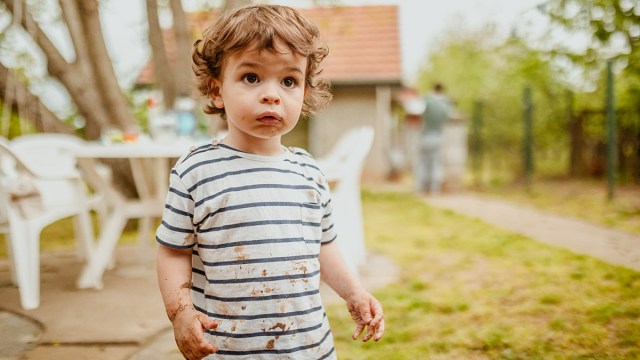“Do not poke your brother in the eye!” “Do not throw your food on the floor!” “Do not run through the parking lot!” If any of these seem vaguely familiar to you, chances are you have a toddler. Kids in this age group are typically pushing the limits, which can lead parents to use a lot of “do not” phrases to try and correct bad behaviors. But if your kid isn’t responding to these statements as you think they should, they might be at a developmental stage where they just don’t understand what some negative words mean.
That’s right, kids between the ages of two-and-a-half and three-and-a-half often haven’t developed the language skills necessary to comprehend these “do not” phrases, according to parenting expert Dr. Chelsey Hauge-Zavaleta. If you’re raising your voice and yelling, “Do not open the fridge!” there’s a good chance your tot will stop what they’re doing because they understand that your tone means they’ve done something wrong. But they don’t necessarily understand that you don’t want them to open the fridge. So when they keep doing it, you get frustrated—and they get confused.
@drchelsey_parenting ♬ original sound – Dr. Chelsey Hauge-Zavaleta
Dr. Hauge-Zavaleta shared an easy way to find out where your toddler is in their language development. “You need two objects that they know the words for, like a strawberry and an apple. With a giant smile on your face and in an empty room, I want you to say, ‘Give me the one that’s not a strawberry,’ and I want you to see that the vast majority of children are going to give you the strawberry every single time.” If your kid gets it right and hands you the apple, she suggest finding someone who’s not a parent and doing the exercise again to see how your toddler responds. “Witnessing your own child not understand the word ‘not’ is probably the most powerful way to move you into positive opposites.”
If you need a refresher on the idea of “positive opposites,” check out this TikTok from Dr. Hauge-Zavaleta that explains how positive phrasing works better with young kids than words like, “no,” “not,” “stop,” and “don’t.” The basic idea is that if you want to say something like, “Don’t run away from me,” you’d instead use a positive phrase like, “We all hold hands in the parking lot.” It’s easier for kids to understand this positive statement.
Reframing the language you use with your toddler takes a little practice, but when you understand their level of development you can better understand what tactics work best to give your kid the best chance to succeed. And, of course, get the behavior you want. It’s a win-win.
